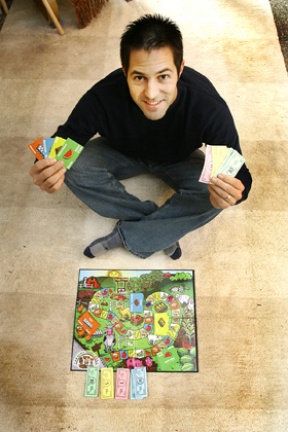An instructive game finds fertile soil in young imaginations.
To some, a quick glance at the product would yield a clear conclusion: the Rohrbacher family is tilling poor soil.
Push a board-game about farming? Today? To kids who once would have burned hours around a rousing game of Monopoly, but now prefer the carpal tunnel-tinged trances of video games? When the farming industry is about as fresh as old fennel?
Thanks for the offer, they would say, but I’ll take my chances peddling Playstations.
But a deeper look reveals that, for David Rohrbacher and his gaming kin, hybridizing two separate but seemingly struggling sectors isn’t such a rotten deal.
“We saw a little bit of a dip in the late 90s,†Rohrbacher said, in response to a question about the effects of modern technology on his family’s board-game sales. “But for whatever reason, they keep selling.â€
That’s not to say Rohrbacher doesn’t believe in the product. After all, The Farming Game has sold more than 600,000 copies since it was created by his father, George, in 1979, as a way to teach the business of farming.
The goal, Rohrbacher said, is as simple as it is true-to-life: build a farm that’s successful enough to let you to quit your day job and live off the land.
As players make their way across the board, they must persevere through both the pinnacles and perils of agriculture. Drought, natural disaster, interest-rate increases. Through the game, the unpredictability of farming becomes apparent.
Until now, it was designed for players age 10 and older. But when Rohrbacher, who moved with his wife Holly to the island two years ago, took over marketing, he decided it was time to adapt it to suit younger audiences.
Hence The Farming Game Kids, an adaptation of the original that he hopes will sustain the operation well into the future.
In the new game, kids ages 3 to 9 harvest food to sell at market. The player who gets to the fruit stand with the most produce wins.
Though the main goal is entertainment, the game also aims to develop skills in addition, subtraction, counting money, reading simple charts and, because cards in the game are displayed in English, French and Spanish, foreign language.
In many ways, both games mirror the story of the Rohrbachers.
The idea for the original game took root nearly 40 years ago on the family’s 1,500-acre wheat and beef cattle farm in Goldendale, near Yakima.
Rohrbacher’s parents decided to move to the tiny farm town to pursue their labors. But they needed something else to supplement their income. Rohrbacher’s mother, Ann, worked at a bank in town. Meanwhile, George toiled in the fields, brainstorming all the while.
“You have a lot of time to think when you’re on a tractor,†David said. “He wanted to write a book about how to be a farmer.â€
Then a friend suggested a board game with a similar aim.
The family borrowed money and created The Farming Game, at first manufacturing it in their basement.
It soon gained a loyal following, particularly in rural areas, and along with being farmers, George, Ann, David and his three siblings soon became retailers responsible for manning phones and shipping orders.
“I was really born into it,†David said. “Calls to the 1-800 number came directly to the house.â€
They still do, though the operation has since been streamlined. The game is now manufactured in Canada and sold across the continent. With little marketing, sales have remained steady.
Rohrbacher said he hopes to expand the business by continuing to create new board-games like The Farming Game Kids and The Construction Game, which focuses on the construction industry.
For now, though, like any farmer, he’s plowing ahead with his staple crop, anchored on an island with plenty of farming lore.
“There’s a lot of history here,†Rohrbacher said. “And Bainbridge still has that rural feel.â€
The games are available at Calico Cat, Bay Hay & Feed, online at www.farmgame.com, or by calling 1-800-222-GAME. Prices range from $25 to $34, depending on the game.



